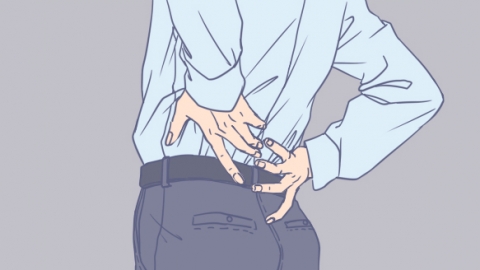What causes sudden weakness and soreness in the lower back and knees?
Generally, sudden soreness and weakness in the lower back and knees may be caused by factors such as overexertion, improper posture, lumbar disc herniation, osteoporosis, or kidney yang deficiency. It is recommended to seek medical attention promptly, identify the underlying cause, and receive symptomatic treatment under a doctor's guidance. Specific analyses are as follows:

1. Overexertion: Intense exercise or heavy physical labor in recent days can lead to lactic acid buildup in the muscles of the lower back and legs, causing soreness and weakness. Reduce activity, rest in bed, and apply massage and heat therapy to the affected areas to improve blood circulation and relieve muscle fatigue.
2. Improper posture: Prolonged sitting or standing, or sudden twisting of the waist, can cause muscle tension and poor circulation in the lower back and legs. Adjust your posture, avoid staying in one position for too long, stand up and move every hour, keep the back straight, and avoid sudden bending or twisting movements.
3. Lumbar disc herniation: A sudden protrusion of the intervertebral disc compresses nerve roots, leading to soreness, weakness, and pain in the lower back and knees. Patients may take medications such as celecoxib capsules, mecobalamin tablets, or mannitol injection as prescribed. In severe cases, surgical removal of the herniated disc may be performed to relieve nerve compression.
4. Osteoporosis: Decreased bone density reduces the skeletal load-bearing capacity, making individuals prone to lower back and knee soreness and general fatigue. Patients may take calcium carbonate D3 tablets, alendronate sodium tablets, or calcitriol soft capsules as directed. They should also consume calcium-rich foods like milk, fish, and shrimp, and get moderate sun exposure.
5. Kidney yang deficiency: In traditional Chinese medicine, this refers to insufficient yang energy, resulting in inadequate warming of the lower back area, manifesting as soreness and weakness in the lower back and knees, cold intolerance, and cold limbs. Patients may take prescriptions such as Jin Kui Shen Qi Wan, You Gui Wan, or Fu Zi Li Zhong Wan as directed. In daily life, they should eat more warming foods like lamb and leeks, and avoid raw or cold foods.
To maintain lower back and leg health, strengthen muscle training with exercises such as "flying swallows" and "five-point support" to enhance muscular stability. Keep the waist warm to prevent chilling, choose a mattress of medium firmness, reduce strain on the lower back, and promote overall musculoskeletal health.




